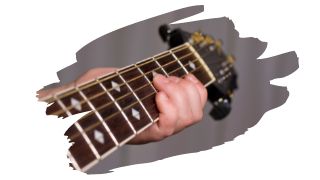Have you ever stopped to puzzle over why your guitar fretboard feels so sticky?
In fact, some gloss maple wood fretboards can feel gummed up, even when brand new. And this can seriously stilt your playing style, especially when all of that stickiness is slowing your fingers down.
Well, the good news is that you can do something about that sticky wooden fretboard. It’s not as easy as giving it a quick wipe with just water. But, you don’t need to worry about damaging your fretboard finish while you clean.
So, in this article, we cover the likely reason why your guitar fretboard is feeling so sticky. You’ll also learn which cleaning solvents you can use to clean wooden fretboards with (and which ones you should avoid).

This post may contain affiliate links to products that we receive a commission for (at no additional cost to you). Learn more here.
Why Does My Guitar Fretboard Feel Sticky?
It’s simply the result of dirt and grime build-up overtime. That, mixed with the natural oils off the ends of your fingertips, and all of that will gather up around those frets.
Also, some finishes are less likely to feel as sticky as others. Glossy finishes (such as Nitrocellulose Lacquer) will feel like they have more friction to them than Satin or Matte finishes (such as Tung oil or Tru-oil).
Related Post: The Top 3 Tru-oil Alternatives That’ll Give Your Guitar A Fine Finish
Stickiness issues can also occur with unfinished fretboards too. Especially fretboards made from naturally oily timber.
For example, Rosewood fretboards are famously left unfinished. Yet even Rosewood guitars can get just as gummed up with dust, dirt and oils.
How Do You Make A Guitar Fretboard Feel Less Sticky?
By cleaning it with a mild solvent. Using water alone won’t be enough to remove oily dirt. Instead, using pure naphtha will work wonders at breaking down grime.
But, avoid using Acetone (which is a stronger solvent than naphtha). That is because Acetone will actively dissolve away a nitro lacquer finish. Although, if your fretboard has been sealed using polyurethane, Acetone won’t damage that finish.
Related Post: Nitrocellulose Lacquer Vs Polyurethane: Choosing A Finish For Your Guitar
And How Exactly Do You Clean A Sticky Fretboard?
By using a lint-free cloth that has been lightly dampened with naphtha, and then rubbing it over the sticky areas of the fretboard.
The key here is to only use a light application of naphtha. If you saturate the fretboard with this solution, naphtha can soften even the hardest of oil finishes.
So, don’t overdo it when applying naphtha onto Tung oil or Tru oil finished fretboards.
Besides, you only need a light dab of this solvent to really loosen things up. The lint-free cloth will do the rest and remove the stickiness.
Related Post: Are Glossy Maple Guitar Fretboards Any Good?
And What About Alcohol? Can You Use Rubbing Alcohol To Clean A Guitar Fretboard?
Rubbing Alcohol, (also known as Isopropyl), will damage a nitrocellulose finish just as well as Acetone can.
Although, isopropyl works more to soften up a nitro finish. While Acetone will actively dissolve nitro away.
Related Post: Is Padauk Wood Good For Guitar Fretboards?
OK, So What About Vinegar? Can I Use Vinegar To Clean My Guitar?
Vinegar itself isn’t actually a cleaner. Sure, it is very acidic, (just like lemon juice). However, vinegar doesn’t actively break down oil build-up.
What vinegar does is kill some types of bacteria. It can also dissolve calcium and even magnesium.
Which is why vinegar gets included in the recipes of a lot of home-made cleaners. However, it is not a natural detergent in and of itself.
So, unless you really love the smell of vinegar as you play, you shouldn’t use vinegar to clean your fretboard.
Related Post: Can You Use Lemon Oil On A Rosewood Fretboard?
To Wrap Up, Here Are The 3 Key Takeaways From This Post…
- 1). A sticky fretboard is usually the result of oil and dirt build up.
- 2). Glossy finished fretboards tend to feel more sticky than ones with a Satin or Matte looking finish.
- 3). If you want to clean a fretboard, without harming the finish, use a touch of naphtha to remove that sticky grime.
References:
Cleaning Myths Debunked: Vinegar | MaidPro.com

